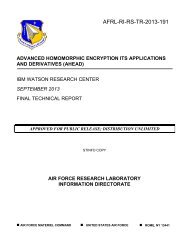EN100-web
EN100-web
EN100-web
You also want an ePaper? Increase the reach of your titles
YUMPU automatically turns print PDFs into web optimized ePapers that Google loves.
Special theme: Scientific Data Sharing and Re-use<br />
anonymized for research purposes [3]?<br />
And what about the re-purposing of data<br />
for ends very far away from the original<br />
research agenda – for military or even<br />
criminal purposes? There are no easy<br />
answers to these questions, and the culture<br />
of ethics surrounding good research<br />
is making some communities tread<br />
warily.<br />
Our survey highlights a lack of knowledge<br />
about the legal aspects of data<br />
sharing and data reuse, in particular<br />
around intellectual property rights,<br />
copyright and licensing, which can act<br />
as a barrier not only for opening data but<br />
also for re-using someone else’s data.<br />
Choosing the right licence, for instance,<br />
can be a daunting task for some<br />
researchers who don’t necessarily<br />
understand the implications of their<br />
actions.<br />
While researchers are naturally keen to<br />
see their research published as widely as<br />
possible, in an interesting contrast to the<br />
open access scholarly paper movement,<br />
open data is viewed differently. Often<br />
research groups invest significant time<br />
and effort in collecting “hard to get data”<br />
which can then be used to build careers,<br />
offering what can only be termed a competitive<br />
advantage over those who do<br />
not have access to the same data. This<br />
issue of credit and consequent career<br />
progression is a real concern in many<br />
communities.<br />
The way forward<br />
While aware of, and supportive of, the<br />
open access data agenda, many research<br />
communities are looking for guidance<br />
about the practicalities of doing it;<br />
training on managing the legal issues,<br />
for instance. They also feel that these<br />
issues should be addressed at cross-disciplinary<br />
level, perhaps rendering the<br />
tasks even more challenging. And while<br />
much of the open access focus is on<br />
coordination efforts, training needs and<br />
policies, researchers also stress the<br />
importance of developing the right tools<br />
and services to enable these policies and,<br />
ultimately, the sharing and reuse of data;<br />
this is seen as particular crucial for handling<br />
sensitive data.<br />
Some final words<br />
Compared to scholarly publications,<br />
open access to research data is both less<br />
developed and more difficult to implement.<br />
Although open access to research<br />
data has only just begun, the broad<br />
spectra of expectations on EUDAT and<br />
other initiatives show that research communities<br />
have the notion that open<br />
access to research data cannot be solved<br />
through isolated activities or actions;<br />
instead it needs to underpin the whole<br />
system, reaching from strategic planning<br />
and overall polices to the mindset and<br />
everyday practice of the individual<br />
researcher.<br />
Link:<br />
EUDAT – European Data project:<br />
http://www.eudat.eu/<br />
References:<br />
[1] European Commission: “Guidelines<br />
on Open Access to Scientific<br />
Publications and Research Data in<br />
Horizon 2020”.<br />
[2] G8 Science Ministers Statement, 13<br />
June 2013, available at<br />
https://www.gov.uk/government/news/g<br />
8-science-ministers-statement<br />
[3] Article 29 Data Protection Working<br />
Party: “Opinion 05/2014 on<br />
Anonymisation Techniques”, adopted<br />
on 10 April 2014.<br />
Please contact:<br />
Marie Sandberg<br />
CSC, Finland<br />
Tel: +358 9 457 2001<br />
E-mail: marie.sandberg@csc.fi<br />
Rob Baxter<br />
University of Edinburgh, UK<br />
Tel: +44 131 651 3579<br />
E-mail: r.baxter@epcc.ed.ac.uk<br />
Providing Research Infrastructures<br />
with Data Publishing<br />
by Massimiliano Assante, Leonardo Candela, Paolo Manghi, Pasquale Pagano, and Donatella Castelli<br />
The purpose of data publishing is to release research data for others to use. However, its<br />
implementation remains an open issue. ‘Science 2.0 Repositories’ (SciRepos) address the publishing<br />
requirements arising in Science 2.0 by blurring the distinction between research life-cycle and<br />
research publishing. SciRepos interface with the ICT services of research infrastructures to intercept<br />
and publish research products while providing researchers with social networking tools for discovery,<br />
notification, sharing, discussion, and assessment of research products.<br />
Data publishing approaches, namely the<br />
“data as a paper” ones [1], are mainly<br />
inspired by scientific literature communication<br />
workflows, which separate the<br />
place where research is conducted, i.e.,<br />
Research Infrastructures (RIs), from the<br />
place where research is published and<br />
shared. In particular, research products<br />
are published “elsewhere” and “on<br />
date”, i.e. when the scientists feel the<br />
products obtained so far are sufficiently<br />
mature. In our opinion, this model does<br />
not fit well with other kinds of research<br />
products, for which effective interpretation,<br />
evaluation, and reuse can be<br />
ensured only if publishing includes the<br />
properties of “within” the RIs and<br />
“during” the research activity.<br />
To enable effective scientific communication<br />
workflows, research product creation<br />
and publishing should both occur<br />
“within” the RI (as opposed to “elsewhere”)<br />
and “during” the research<br />
activities (as opposed to “on date”). To<br />
facilitate this, research infrastructure<br />
ICT services should not only be<br />
devised to provide scientists with facilities<br />
for carrying out their research<br />
activities, but also to support marketplace<br />
like facilities, enabling RI scientists<br />
to publish products created by<br />
research activities and other scientists<br />
to discover and reuse them. In other<br />
words, RIs should not rely on thirdparty<br />
marketplace sources to publish<br />
20<br />
ERCIM NEWS 100 January 2015



